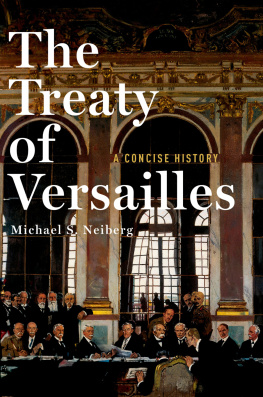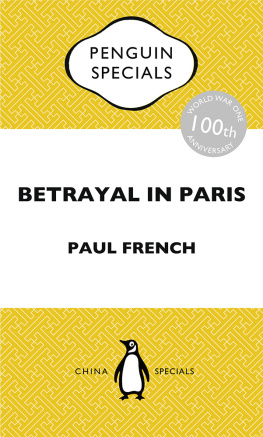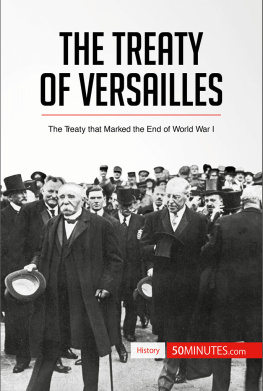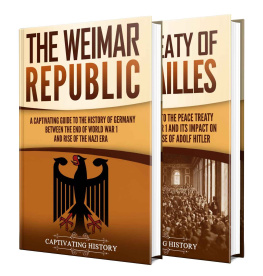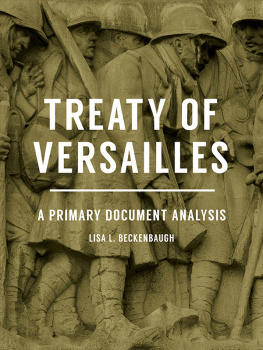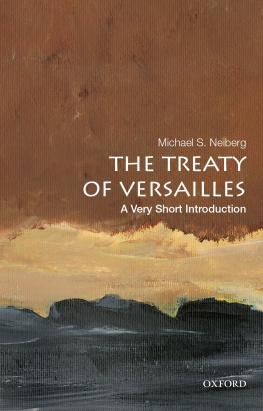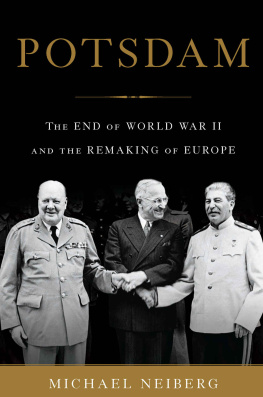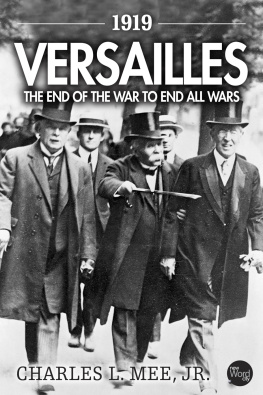Neiberg Michael S. - The Treaty of Versailles
Here you can read online Neiberg Michael S. - The Treaty of Versailles full text of the book (entire story) in english for free. Download pdf and epub, get meaning, cover and reviews about this ebook. year: 2017, publisher: Oxford University Press, Incorporated, genre: History. Description of the work, (preface) as well as reviews are available. Best literature library LitArk.com created for fans of good reading and offers a wide selection of genres:
Romance novel
Science fiction
Adventure
Detective
Science
History
Home and family
Prose
Art
Politics
Computer
Non-fiction
Religion
Business
Children
Humor
Choose a favorite category and find really read worthwhile books. Enjoy immersion in the world of imagination, feel the emotions of the characters or learn something new for yourself, make an fascinating discovery.
- Book:The Treaty of Versailles
- Author:
- Publisher:Oxford University Press, Incorporated
- Genre:
- Year:2017
- Rating:5 / 5
- Favourites:Add to favourites
- Your mark:
- 100
- 1
- 2
- 3
- 4
- 5
The Treaty of Versailles: summary, description and annotation
We offer to read an annotation, description, summary or preface (depends on what the author of the book "The Treaty of Versailles" wrote himself). If you haven't found the necessary information about the book — write in the comments, we will try to find it.
The Treaty of Versailles — read online for free the complete book (whole text) full work
Below is the text of the book, divided by pages. System saving the place of the last page read, allows you to conveniently read the book "The Treaty of Versailles" online for free, without having to search again every time where you left off. Put a bookmark, and you can go to the page where you finished reading at any time.
Font size:
Interval:
Bookmark:


Oxford University Press is a department of the University of Oxford. It furthers the Universitys objective of excellence in research, scholarship, and education by publishing worldwide. Oxford is a registered trade mark of Oxford University Press in the UK and certain other countries.
Published in the United States of America by Oxford University Press 198 Madison Avenue, New York, NY 10016, United States of America.
Oxford University Press 2017
All rights reserved. No part of this publication may be reproduced, stored in a retrieval system, or transmitted, in any form or by any means, without the prior permission in writing of Oxford University Press, or as expressly permitted by law, by license, or under terms agreed with the appropriate reproduction rights organization. Inquiries concerning reproduction outside the scope of the above should be sent to the Rights Department, Oxford University Press, at the address above.
You must not circulate this work in any other form and you must impose this same condition on any acquirer.
Library of Congress Cataloging-in-Publication Data
Names: Neiberg, Michael S., author.
Title: The Treaty of Versailles : a concise history / Michael S. Neiberg.
Description: New York : Oxford University Press, 2017.
Identifiers: LCCN 2016046300 | ISBN 9780190659189 (hardback) | eISBN 9780190659202
Subjects: LCSH: Treaty of Versailles (1919)History. |
World War, 19141918PeaceHistory. | BISAC: HISTORY / Europe / Western. |
HISTORY / Modern / 20th Century.
Classification: LCC KZ186.2 .N45 2017 | DDC 940.3/141dc23
LC record available at https://lccn.loc.gov/2016046300
Dedicated to the memory of Jeffrey Grey
The process of peacemaking lasted longer than the First World War it endeavored to end. The Paris Peace Conference began on January 18, 1919, on the anniversary of the coronation of the German emperor Wilhelm I in the Palace of Versailles in 1871. That event had occurred at the end of the Franco-Prussian War, which had resulted in the unification of Germany and the seizure by the new Germany of two formerly French provinces, Alsace and Lorraine. Although the anger in France over these events had largely dissipated outside of right-wing circles by 1914, the First World War reawakened the memory of the harsh terms that Germany had imposed on France half a century earlier. Those terms had included not just the loss of territory but also an occupation and a large financial indemnity, which the French paid ahead of schedule. Opening the Paris Peace Conference on such a historic anniversary served to remind the French of why, ostensibly, they had fought the war and who would pay for the damages this time. It has also contributed to the image of the Paris Peace Conference as one motivated primarily by vengeance.
Although the senior statesmen stopped working personally on the conference in June 1919, the formal peace process did not really end until July 1923, when the Treaty of Lausanne was signed by France, Britain, Italy, Japan, Greece, and Romania with the new Republic of Turkey. Lausanne was a renegotiation prompted by the failures of the one-sided Treaty of Svres, signed in August 1920 but immediately rejected by Turkish forces loyal to the war hero Mustafa Kemal. Svres had partitioned Turkey, ceding much of its territory to Armenia, Greece, France, and Britain, with Italy receiving a large zone of influence in southern Anatolia. The sultan had approved the treaty, but Kemal then led an army that deposed the sultan, threatened a renewal of war in the Middle East, and forced a true negotiation at Lausanne.
The conference also produced the Treaty of St. Germain with Austria in September 1919, the Treaty of Neuilly with Bulgaria in November 1919, and the Treaty of Trianon with Hungary in June 1920. These treaties meted out relatively lenient terms to Austria, especially given the Austrian elites central role in starting the war in 1914. Hungary came out much worse than Austria did, largely to punish Hungarians for their postwar flirtation with a communist movement. Thus the conference had as much to do with postwar politics as perceptions of prewar guilt.
But the centerpiece of the Paris Peace Conference was always the Treaty of Versailles, signed on June 28, 1919, five years to the day after a teenaged Serbian nationalist, Gavrilo Princip, had assassinated Austrian archduke Franz Ferdinand and his wife in Sarajevo. The treaty and the conference are thus closely linked but not quite synonymous. None of the other treaties bear such a heavy historical responsibility for the world they created or the conflicts that followed, although perhaps they should. The Treaty of Svres in particular created the conditions for massive change in Turkey, Central Asia, and the Middle East. Still, it is the Treaty of Versailles for which the Paris Peace Conference will probably be best remembered, and most often damned.
The dozens of statesmen, diplomats, and advisers who assembled in Paris in 1919 have come in for heavy criticism for writing treaties that failed to give Europe a lasting peace. Even many of the people most deeply involved with the peace process recognized their shortcomings early on, in some cases before the text had even been drafted. Perhaps most famously, British economist John Maynard Keynes wrote a scathing indictment of the treaty in a 1920 bestseller entitled The Economic Consequences of the Peace. He predicted that the economic arrangements of the peace treaty would destabilize the European and global economies, leading to major financial crises. Similarly, American president Herbert Hoover criticized the Treaty of Versailles in his memoirs for causing the worldwide economic depression that began in 1929.
Participants quickly grew disillusioned by the old-fashioned horse trading and back-room dealing that overwhelmed the ideals and principles of those who had hoped to fashion a better world out of the ashes of the war. Few people came out of Paris optimistic about the future. Woodrow Wilsons senior adviser on the Middle East, Columbia University professor William L. Westermann, captured the views of many participants in his final diary entry from Paris, which described the treaty as wrong in spirit and quite wrong in its methods. Time soon proved him right. It is a great tragedy that so many people like Westermann had come to Paris optimistic only to leave totally disillusioned.
The Germans had hoped until the very end for a moderate treaty based on negotiation or the idealistic principles of Woodrow Wilson. Wilsons ideas, as articulated in his Fourteen Points speech of January 1918, included a League of Nations, an end to secret diplomacy, freedom of the seas, and a reduction of national armaments. He also hoped to reshape the borders of Europe to remove nationalism as a cause of international conflict. Wilson saw his Fourteen Points as the basis for the construction of a new world order. Critics saw him as hopelessly naive about the true inner workings of the world. On seeing the Fourteen Points, French prime minister Georges Clemenceau quipped that God himself was content to give mankind just ten. More importantly, the British saw Wilsons program as a threat to their own power in the postwar world. Simply put, there was no point in fighting so hard to win the war if victory came on Wilsons terms.
The Germans, however, had believed in the Fourteen Points because they offered a glimmer of hope. Germany therefore reacted with fury and anger to the final terms of the treaty. The Allies searched for German officials who would affix their names to such a lopsided treaty, then summarily called them into the majestic Hall of Mirrors at Versailles for a short and anticlimactic signing ceremony. The Germans were not the only ones who were disappointed. French marshal Ferdinand Foch, the man who had done as much as anyone to secure Allied victory on the battlefield over those same Germans, protested the treaty by declining to attend the signing ceremony. Foch believed that the treaty did not do enough to ensure French and European security from a resurgent German threat. The Chinese delegation, too, stayed away in order to protest the cession of economic privileges in the Shandong Peninsula to Japan. Several senior Allied officials either resigned in protest at the terms of the treaty or strongly protested portions of it. Some saw the treaty as too harsh toward Germany, others as too lenient. Almost everyone agreed, however, that the great challenge of the postwar years would be to find ways to rebuild Europe on the basis of a flawed treaty.
Font size:
Interval:
Bookmark:
Similar books «The Treaty of Versailles»
Look at similar books to The Treaty of Versailles. We have selected literature similar in name and meaning in the hope of providing readers with more options to find new, interesting, not yet read works.
Discussion, reviews of the book The Treaty of Versailles and just readers' own opinions. Leave your comments, write what you think about the work, its meaning or the main characters. Specify what exactly you liked and what you didn't like, and why you think so.

